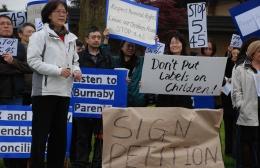Under the watchful eyes of RCMP officers, close to 300 placard-waving opponents and supporters of a draft anti-homophobia policy squared off for about an hour outside the Burnaby Board of Education office on May 10.
The sometimes-tense confrontation followed an April 26 board meeting where almost 100 parents objected to the school board’s proposed Policy 5.45 to protect queer students’ rights.
Many of the policy’s critics say they support the concept of respect for all but feel the proposal promotes reverse discrimination, is an infringement of parents’ rights and privileges a certain political ideology.
During a May 10 interview on CKNW, when asked what he’s afraid of, parent James Gray eventually told radio host Bill Good he thinks the policy’s proponents are “certainly leftwing-driven” and have a political agenda to target and market children.
Burnaby school board trustee Gary Wong cites several reports indicating that homophobia is a problem throughout the province. He also notes that the BC Trustees Association — which “represents trustees of all political stripes” — voted for a recommendation calling on all school districts to adopt policies similar to 5.45.
Rainer Bohl told trustees at the May 10 board meeting that he opposes the policy because it promotes a strategy to “reeducate our society and try and force everyone to adopt one homogeneous view with respect to LGBTQ lifestyle.”
He says media reports show that 5.45 is already pitting various cultural, ethnic and religious groups against each other, noting that posted reader comments “attacked people who dared to speak against the policy.”
“All we’re asking is that we be given the right to live the way we want to live. I don’t believe that we’re too young to make our own decisions about it,” counters Grade 12 student Darra Evans outside the meeting.
Evans, who says she’s read the policy, notes that some people may have a problem with its wording.
“Perhaps if we can sit down and change the wording, that makes them happy, but I still think there should be a policy about homophobia in schools.
“I am graduating but it’s still very important to me,” she adds. “A lot of my friends are bisexual or lesbian or gay, and I’ve seen them get pushed around; I’ve seen them get hurt because of something they can’t control, basically.”
But parent Rifdhy Nizan, who opposes the policy, says being lesbian or gay is “not the right thing” and should not be encouraged. “I worship one God, so we don’t believe in that. So that’s why I’m here today.”
Principals and other school authorities are responsible for controlling bullying, he adds.
Jeanne Keegan-Henry, whose daughter attends a Burnaby school, argues that queer students need very specific protection against bullying, pointing to the number of suicides that occurred in the past year because of bullying. “If you changed everything in the original policy to say Chinese or black or Hispanic or any racial thing, it would be appalling to oppose it,” she adds.
Charter Lau of ParentsVoice takes issue with the policy’s definition of heterosexism. “If you think that heterosexuality is the norm, then you are heterosexist, then you are a danger to the individual and the community. If someone thinks homosexuality is normal, then you’re okay.”
In the policy, heterosexism is defined as “the mistaken assumption that all people are heterosexual and that heterosexuality is superior and the norm by which all other sexual orientation and gender identities are measured.” The policy also states that heterosexism “perpetuates negative stereotypes and is dangerous to individuals and communities.”
Another problem, Lau says, is that the policy protects only homosexuals from discrimination. “If the policy only covers part of the community, not the other part, then it’s not fair.”
“I think it’s a lack of understanding around what the policy is supposed to mean, actually,” Burnaby Teachers Association vice-president James Sanyshyn says.
“Some of it’s a language barrier,” he adds. “The policy is only available in English, and I think the board is making moves to translate it into other languages. Apparently, some of the words that appear in the policy don’t translate into other languages, so if they could find words that mean the same thing but have a literal translation, then that could assist in terms of understanding.”
Sanyshyn, who sits on the committee tasked with addressing homophobia in the district’s schools, says the board could look at changing a few words, but not the intent, by giving an opt-out clause.
Steve LeBel of BC’s Pride in Education Network says the board needs to have information meetings with parents — “not a policy meeting like tonight” — to explain how the policy translates into classrooms and behavioural policies.
Most, though not all, parents will think that’s reasonable, he believes, even if they still don’t like gays and lesbians.
Sanyshyn is optimistic the board will still have the will to pass the policy, despite the opposition.
Board chair Larry Hayes says there’s still a lot of misinformation about the policy. “We’re not trying to change curriculum; we’re not trying to indoctrinate children or sexualize our elementary schools,” he says.
“The realities of the world is that there are a lot of different types of people out there, and I think part of our job as educators is to not hide that fact but ensure people realize that everybody has to be recognized, respected and treated with dignity.”


 Why you can trust Xtra
Why you can trust Xtra


